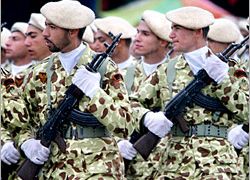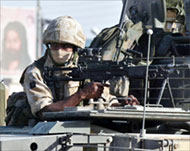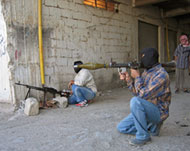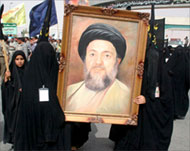Iran accused of helping Iraqi fighters
Britain believes Iran’s Revolutionary Guard is supplying explosives technology that is killing British soldiers in Iraq, a senior official has said.

The official, briefing reporters on condition of anonymity on Wednesday, said there was evidence that Iran was in contact with Sunni Muslim groups battling US and British troops in Iraq.
He did not specify whether the Iranian technology was also responsible for US soldiers’ deaths.
He said Iran could be trying to warn Britain off its demands that Iran abandon its nuclear programme.
“It would be entirely natural that they would want to send a message ‘Don’t mess with us’,” the official said. “It would not be outside the policy parameters of Tehran.”
He said Britain believed Iran’s Revolutionary Guard had given anti-government fighters the technology – originally obtained from Lebanese Hizb Allah – used in a series of deadly attacks on British troops in southern Iraq over the summer.
No comment
The official declined to comment on whether Britain believes the Revolutionary Guard was acting independently or on the Iranian government’s orders.
 |
|
A series of attacks killed several |
The Revolutionary Guard is a military organisation separate from the regular armed forces.
Iranian President Mahmoud Ahmadinejad, who was inaugurated earlier this month, is a former commander in the Guard.
The official said there was likely to be an increase in violence in Iraq in the run-up to the constitutional referendum 15 October and elections in December.
“That is what the security forces are preparing for. There are a lot of people who don’t want this process to succeed,” he said.
Saddam Hussein trial
The official also said that Saddam Hussein’s trial, due to begin 19 October, could be delayed until after the elections because logistics like bullet-proof screens and witness-protection programmes were not yet ready.
“I think there are some logistical problems. There are a lot of things they haven’t got round to yet,” the official said.
 |
|
A UK official says arms from Iran |
Meanwhile, on a visit to India, the British Defence Secretary John Reid has said Iraqi fighters will launch more “vicious” attacks on international forces and civilians before the December general election.
Reid also warned that Muslim fighters were trying to spark a civil war by murdering scores of Shias, who constitute the majority in the country.
Civil war
“As things get steadily better in Iraq, there will be a period during which the terrorists will become more fanatic, more vicious and we have already seen it,” Reid, who is on a two-day visit to India, told a news conference on Wednesday.
Besides fighting American, British and other foreign troops, the rebels were trying to ignite a civil war, he said. “That is why they are murdering en masse Shia Muslims … they are doing it with an awful, terrible venom,” Reid said. “It is with a purpose: to provoke a Shia backlash and create a civil war.”
Britain has hundreds of soldiers in southern Iraq and 95 have been killed since the US-led invasion in March 2003. Reid said British troops would stay in Iraq as long as it took Iraqis to build a democratic political framework.
Speaker’s accusation
Iraqi parliament speaker Hajim al-Hasani meanwhile has accused Iran of being behind the assassination of two top Shia clerics in Iraq in 2003, a Kuwaiti newspaper reported.
“Baghdad has conclusive evidence of Iran’s involvement in the
assassination of Ayat Allah Mohammed Baqer al-Hakim and Abdul Majid al-Khoie,” he was quoted as saying by conservative Muslim MPs in Kuwait, Al-Anbaa said in its Thursday edition.
 |
|
A massive bomb blast killed |
“Hasani told the MPs that Iran saw that Hakim and Khoie did not serve its future interests in Iraq … because of their firm
position on Iraq being an Arab country,” the paper quoted the
sources as saying.
Al-Hakim, former leader of the Supreme Council for the Islamic
Revolution in Iraq (SCIRI), was killed in a massive car bombing in late August 2003 in Najaf that cost more than 80 lives.
Al-Khoei, a moderate who had cooperated with the British and US governments while in exile, was stabbed to death in April 2003.